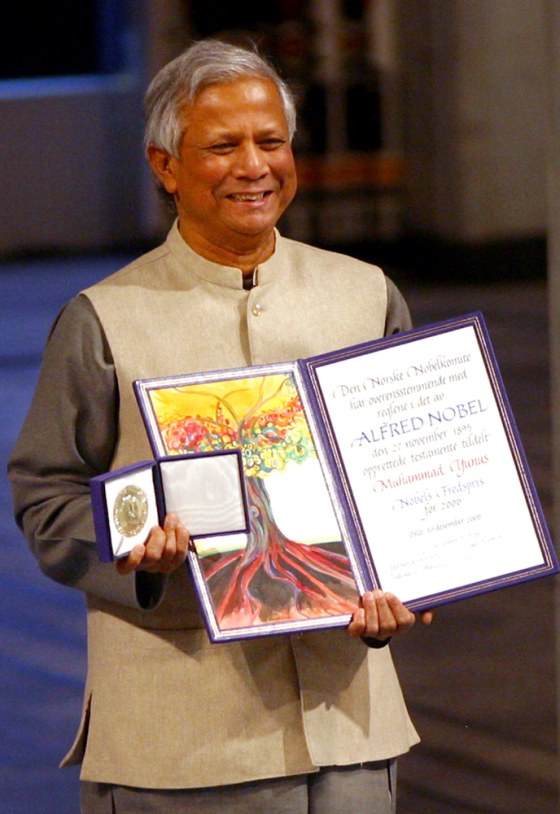Nobel Peace laureate Muhammad Yunus said Saturday the prize has given momentum to his cherished program of helping the poor through small loans, bringing him flood of e-mails and invitations to meet with world leaders.
Yunus, a Bangladeshi economist, was in Oslo to accept the 2006 peace prize he shared with his Grameen Bank, which for more than two decades has helped people rise from poverty through microcredit.
The loans are enough for a family to buy a goat, a cell phone to rent out, or raw materials to make products for sale. The laureate said the world pays more attention when he promotes microcredit as an effective means of fighting poverty.
“I have said it many thousand times before,” Yunus told a news conference. “But when I screamed before, people hardly heard me because my voice didn’t go very far. Today, with the Nobel Peace Prize, if I whisper the whole world hears me loud and clear.”
He later told The Associated Press that he gets invitations to visit world leaders, including German Chancellor Angela Merkel and British Prime Minister Tony Blair, and is receiving “so much mail these days that I can’t even open my e-mail.”
“That is the kind of difference the Nobel Peace Prize makes,” Yunus said.
“I have been to London many times, but (before the prize) only stood outside No. 10 Downing Street looking in,” he said, referring to Blair’s offices.
'Poverty is a threat to peace'
Yunus is the first Nobel Prize winner from Bangladesh, a poverty-stricken southeast Asian nation on the Bay of Bengal. At the news conference, he said his win emphasized the link between eliminating poverty and achieving peace.
“Poverty is a threat to peace,” he said. “That is a message for the whole world.”
Grameen Bank was the world’s first lender of microcredit to poor people who do not qualify for loans from conventional banks. No collateral is needed, and repayment is based on an honor system, with about a 98 percent repayment rate.
The average loan is about $200, and interest rates range from zero to 20 percent depending on how the money is used. About 7 million people have Grameen loans, 97 percent of them women.
Yunus said Grameen is helping reduce poverty levels in Bangladesh by about 2 percent a year.
“If Bangladesh, with a very big population of 145 million, can reduce poverty by half by 2015, it is an exciting thing for the whole world,” he said. “If we can do it, anyone can do it.”
Yunus dreamed up the idea while visiting poor regions after returning home with a doctorate in economics from Vanderbilt University in Tennessee. He loaned rural women enough to buy raw materials needed to make reed chairs.
Grameen, which means rural in Bengali, was formally incorporated in 1983.
The idea has spread around the globe over the decades and is said to have helped more than 100 million people take their first steps to rise out of poverty.
Awarded over $1 million
Yunus said commercial banks may now have to rethink how they lend money, perhaps setting up special branches to provide microcredit.
Yunus said his half of the $1.4 million prize money would go toward setting up “a social enterprise” to provide low cost food to the poor.
Being a Nobel laureate, Yunus told the AP, is even giving him a role as “the voice of sanity” in Bangladesh’s often chaotic politics.
He said criticizing Bangladeshi political parties often brings anger and ostracism “but I can do it and get away with it ... because of the Nobel Peace Prize.”
Yunus and Grameen board member Mosammat Taslima Begum will receive the prize at a gala ceremony at the Oslo City Hall on Sunday, followed by a followed by a torchlight parade and banquet.
The Nobel prizes in medicine, chemistry, physics, literature and economics will be presented in ceremonies in Stockholm, Sweden, that same day — the anniversary of the death of Alfred Nobel, the creator of the prizes.
